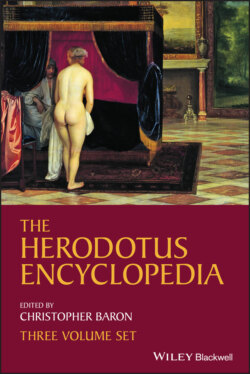Читать книгу The Herodotus Encyclopedia - Группа авторов - Страница 649
ARISTOCRACY
ОглавлениеMAREK WECOWSKI
University of Warsaw
In recent scholarship, the very notion of Greek aristocracy (from the Greek aristos and kratos, “rule of/by the best”) has been challenged. Instead of looking for “aristocracy” as a well‐defined social group, historians tend to study diverse mechanisms of “social recognition” of those aspiring to elite status. In other words, scholars focus on the activities and strategies adopted by individuals who allegedly were in constant need of negotiating or confirming their “prestige.”
As for so many historical problems one would expect him to dwell upon, Herodotus—our main narrative source for Greek society in the ARCHAIC AGE and early classical period—never explicitly touches upon the status of “aristocrats.” He usually takes it for granted and only deals with this issue when confronted with shocking, aberrant, or at least abnormal circumstances. Thus, the birth criterion, a priori the most important aristocratic benchmark, only comes to the fore when ridiculed by Egyptian PRIESTS in the famous scene mentioning the divine pedigree of the writer HECATAEUS (2.143.1). When a former associate of the tyrant POLYCRATES, MAEANDRIUS (II), magnanimously decides to restore political FREEDOM to his fellow citizens on SAMOS, he must face dire accusations of being unworthy of leadership anyway, since he is low‐born and “pestilent” (3.142.5). In ATHENS, MILTIADES THE ELDER is described in some detail as belonging to a FAMILY that rears racing HORSES as well as stemming from an important hero AEACUS. But this is only mentioned because it helps us understand that Miltiades could still be powerful in Athens when the city was ruled by the tyrant PEISISTRATUS (6.35.1–2). In the case of the grand wedding of AGARISTE (I), the daughter of CLEISTHENES the tyrant of SICYON (6.126–30), her suitors, lured by the tyrant to prove themselves as the best men in HELLAS, compete in andragathiē, “manly virtue.” Even before the tyrant will test them all year long mainly in athletics and in table manners at symposia, they can boast about their fathers’ (or their elder brothers’) lavish lifestyle, family riches, good looks, wisdom, athletic victories, exceptional physical strength, family connections to powerful TYRANTS, and even personal familiarity with gods. The only common denominator here is the widely recognized notoriety of a given family, so as far as individuals are concerned, the only clear criterion for being recognized as an “aristocrat” is some sort of celebrity, with good birth as an ideological sine qua non. Most often, however, we only learn of such individuals from Herodotus that they were notable or powerful in their local communities.
When describing entire social groups, Herodotus deals with a few exceptional cases of monopolizing a city’s political power and economy, such as that of the BACCHIADAE at CORINTH, the Hippobotai (lit. “feeders of horses”) of CHALCIS (5.77.2–3), or the Gamoroi (lit. “landowners”) of SYRACUSE (7.155.2). But besides the aberrant case of the Corinthian oligarchs, explicitly characterized as appalling in their radical social exclusivity (5.92.β.1–ε.2), the other group names seem only to add some local flavor to a more general phenomenon. Namely, those in a more elevated social position are always described as “the wealthy ones” and often literally “the fat ones” (pachees). In Herodotus, the “wealthy ones” are sharply contrasted with the dēmos or the masses of citizenry. On several occasions, we hear of political fights between the two groups, resulting, for example, in the expulsion of the pachees from NAXOS (5.30). On AEGINA, the pachees had the upper hand over the dēmos and even massacred 700 of their fellow citizens (6.91.1–2). Even more importantly, the tyrant GELON orchestrates deportations of the pachees of MEGARA HYBLAEA to Syracuse and bestows citizenship on them, while selling the dēmos of Megara into SLAVERY at the same time. And he does the same for the Euboeans of SICILY (7.156.2–3; see LEONTINI).
These two cases show that the contrast between the dēmos and “the wealthy ones” can be used as a legal or political criterion of some precision. In other words, at any given time both fellow citizens and external political agents were perfectly capable of defining or marking off the “aristocrats” of any given community. Such groups, without being legally or constitutionally defined, and most probably rather fluid given the strength of the wealth criterion and so the potential influx of the nouveaux‐riches, were nonetheless unambiguously distinguishable as a group in the eyes of Herodotus and his envisaged AUDIENCE.
SEE ALSO: aretē; Athletes and Athletic Games; Competition; Democracy; Oligarchy; Wealth and Poverty
